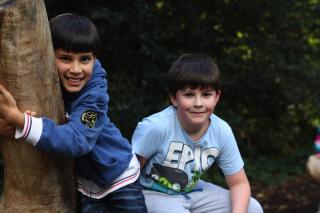
I was just reading a news article and someone was quoted as saying: "Your kids don’t need a 40-year-old friend. They need a parent."
What a tragic dichotomy that one little line sets up!
Every single time that line has ever entered my head, it was leading me in the wrong direction. Every time.
What is a friend? I'm not talking about the schoolmates teenagers go out partying and drinking with. Not talking about the 5-year-old kid your child happens to play with at the park that day. I'm talking about real friendship.
1. a friend: one attached to another by affection or esteemKnowing what I know now, with my kids grown, I strongly feel that that that one line, which permeates parental consciousnesses, should be quickly and actively contradicted and rooted out like a pernicious weed every single time it sprouts up.
Instead of "You're the parent, not their friend," substitute, "Be the very very best friend to them you can possibly be."
Do your kids need you to be their "40 year old friend?" YES! Children do need to feel attached to their parents "by affection or esteem." What better connection is there than by affection and esteem?
AND what's more, parents need their children's friendship, too. Some people seem to think there is something wrong with parents "needing" their children. They act like being mutually attached to each other means children have not become independent enough and parents are being a "burden to their children."
A 40-year-old friend isn't going to have the same relationship with a 5-year-old as his/her 5-year-old friends or 10-year-old friends. And parent-child friendships evolve over the years until they are, eventually, adult-with-adult friendships.
There is nothing wrong with wanting to be your child's friend. Do what it takes to earn their friendship—be supportive and kind and honest and trustworthy and caring and generous and loyal and fun and interesting and interested in them and all the other things that good friends are to each other. Be the best 40 year old friend you can be (or whatever age you are).
People use "I'm the parent, not a friend," as an excuse to be mean, selfish, and lazy. Instead, be the adult in the friendship. Be mature. You've BEEN a five-year-old and your child has not been a forty-year-old, so you have an advantage in terms of long-term and wider perspective. Use that advantage to be an even better friend. You know how to be kinder and less self-centered and you know how beneficial it is to put forth the effort.
I can honestly say that my children and I are friends. I know they'd say the same. I'm not trying to act like I'm 18 or 21 or 24—I am 57 years old. They're having a "Halo" party at someone else's house tonight and will stay up all night playing video games and I'm not going to go and hang out with them all night and play Halo. I'm going to make a huge platter of deviled eggs for them to take over there, but I'm going to stay home and watch a movie with my husband and go to bed early enough that I'll feel good tomorrow. I'm not 18 and I don't recover as quickly as they do from a night with no sleep. I didn't go to the midnight showing of the Terminator movie the other night, for the same reason. But I was certainly invited and welcome.
My kids are not spoiled brats because I've tried to be their friend. They hold jobs, they manage money, they make good and responsible decisions. We are very strongly "attached by affection and esteem."
I wish I could wipe that expression out of everybody's minds and replace it with "Be the best friend to your children that you can be."
-pam
I remember a moment very clearly from my teen years. My Mum and I had another of our screaming matches and I had stormed off to my room, slamming the door while crying those big, heavy, uncomfortable sobs. I was still sitting on my bed a while later, trying to find some comfort in my space when she knocked and asked to come in. She had cooled off a bit and was trying to reach out. I remember telling her, through all the snot and tears, "I just need you to be my friend." Her response? "I can't be your friend, I'm your parent."
She wasn't trying to be mean, she was buying into the conventional "wisdom" of that time. I remember so well the feeling that solidified for me in that moment. I knew I couldn't trust her. I knew I wouldn't tell her certain things or reach out to her in the same way again. Those words rang in my ears..."I can't be your friend." It stuck. We weren't friends again for a very long time. I loved her and she loved me, always. But the friendship didn't come until I had lived away from home for many years.
This topic came up at the Always Learning list today and I want to share what Pam Sorooshian wrote on this matter. As usual, she put it in such a clear and poetic manner. I will always be my children's parent AND friend. One can be both.

Whether in person or at a distance, online, it can be helpful to know other unschooling families. Seeing how others handle everyday or unusual situations, how they amuse themselves and comfort one another, can make it easier to understand and relax.


